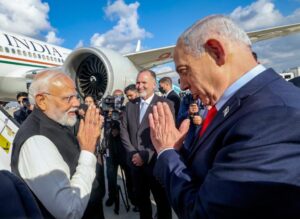Bad Learner Trump Sows Seeds Of Recession

Donald Trump’s “Liberation Day” tariffs have sowed the seeds of global recession (Michal Vadon/Flickr Credits CC BY-SA 2.0)
In much the same way as in the 1930s which saw the Great Depression, US President Donald Trump’s tariffs threaten to destabilise the global economy by sowing the seeds of recession.
The volatility seen in stock markets the world over is a good barometer of the economic uncertainties that President Trump’s unilateralism has introduced. Expectations are rife that global growth will decelerate in 2025, with investment banks, Goldman Sachs, and JP Morgan, predicting that the US will slide into a recession before the end of the year.
These predictions remain despite the 90-day postponement in the implementation of “reciprocal tariffs”, after Trump took the most extraordinary step of imposing “reciprocal tariffs” on 57 trade partners on April 2.
However, in the case of China, which had announced imposition of retaliatory tariffs of 34 percent on all products imported from the US, Trump announced an increase in “reciprocal tariff” twice within 24 hours, initially from 54 percent to 104 percent, and then to 125 percent.
Trump has now clarified that he has raised tariffs on Chinese goods by a total of 145 percent since taking office.
This marks one of the darkest times in trade diplomacy, with the two largest economies engaged in a tit-for-tat tariff war that can throw the global economy off the cliff.
It is almost impossible to argue that Trump’s decision to postpone implementing “reciprocal tariffs” is a “relief” provided to the targeted countries because tariffs are central to the trade policy that he has been pursuing since his first term in office.
The 56 countries (other than China) on whom the tariff burden is sought to be increased must consider Trump’s decision to postpone the implementation of these tariffs to better prepare themselves.
India would have to consider carefully how it can find an effective negotiating counter to trade off the 37 percent tariff burden that President Trump imposed through his April 2 announcement without conceding too much during the on-going bilateral trade agreement negotiations.
Trump’s protectionist policies, which are here to stay, have an uncanny similarity with the sweeping protectionist measures that the US had adopted in the aftermath of the First World War.
The US Congress passed the temporary Emergency Tariff Act in 1921, followed a year later by the Fordney-McCumber Tariff Act of 1922, which authorised the president to raise or lower a given tariff rate by 50 percent in order to even out foreign and domestic production costs.
Trade protectionism in the US escalated after Herbert Hoover won the 1928 elections with the Republican Party expressing its “belief in the protective tariff as a fundamental and essential principle of the economic life of [the] nation”.
It justified protectionism arguing that adherence to this policy was “essential for the continued prosperity of the country” and that “the standard of living of the American people [were] raised to the highest levels ever known”.
This election pledge was implemented through the enactment of the Smoot Hawley Tariff Act of 1930 that raised the average tariffs to over 42 percent, the highest ever in American history.
The Smoot Hawley Tariff Act had two inimical consequences.
First, it triggered a trade war as nine nations, including France, Switzerland, Italy, and Canada, imposed retaliatory tariffs targeting US products, resulting in a fall in US exports to retaliating nations by about 28 percent to 32 percent.
Second, as a consequence of the tit-for-tat tariffs, the economic crisis caused by the stock market crash of 1929 deepened, culminating in the Great Depression, the worst and longest economic downturn in modern history.
The developments since the announcement of the “reciprocal tariff” by Trump mirror those that took place since the unveiling of the Smoot Hawley Tariff Act of 1930 in two ways.
Several US trade partners have either imposed retaliatory tariffs or are threatening to do so. China imposed retaliatory tariffs and has vowed to “fight to the end”, a clear sign that a bruising trade war has begun.
However, most countries avoided a confrontationist approach, preferring to negotiate with the Trump Administration.
Stephen Miran, the current chair of the council of economic advisers, indicated that this approach has the backing of the American president who “views tariffs as generating negotiating leverage for making deals”.
While negotiating bilateral deals with more than 50 countries is going to be arduous and time-consuming, it is also going to be quite complex.
However, the longer-term implications of the Trump tariffs are even more worrisome. Trump’s whims and fancies have dealt a crippling blow to the rules-based multilateral trading system that was established to ensure transparency and predictability for orderly conduct of trade.
Since the end of the Second World War, global trade has consistently drawn sustenance from the multilaterally agreed set of rules, first through the implementation of the General Agreement on Tariffs and Trade (GATT) and then through the implementation of the covered agreements under the World Trade Organization (WTO).
In his first term, Donald Trump had taken several drastic measures, especially by jeopardising the functioning of the dispute settlement body of the WTO.
The trade war that he has now initiated will cause an existential crisis for the multilateral trading system.
Trade wars have no winners: Herbert Hoover learnt this bitter lesson in the 1930s. This unfortunate reality is staring Trump in the face. He should have paid heed to the adverse consequences of the trade protectionism he had pursued in his first term before embarking on the misadventure of a trade war.
When Trump won the election in 2016, the US share in global trade had recovered from effects of the 2008 economic recession to rebound to 11.5 percent from 10.2 percent in 2011.
However, when he left the White House in 2021, the US share had fallen to 10.4 percent. In contrast, however, China’s share had increased during Trump’s first term from 11.5 percent to 13.4 percent, according to calculations by this author using WTO data.
(Published under Creative Commons from 360info™. Read the original article here)





